Edward Willett's Blog, page 38
February 1, 2014
A couple of more Masks reviews to note…
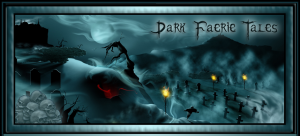 First, Masks got a second review in Locus this latest issue. Carolyn Cushman writes (not online),
First, Masks got a second review in Locus this latest issue. Carolyn Cushman writes (not online),
“Blake…know how to turn out an old-fashioned adventure with just enough of a dystopian edge to feel new again.”
Meanwhile, Dark Faerie Tales gives Masks 4/5 stars…er, ravens, saying:
“Young adult books can sometimes be hit or miss with me, depending on how I feel about the protagonist. Luckily, this book was a big hit. From the first page, it had me hooked…it was still a thrilling ride from beginning to end….it’s not for the faint of heart, but those who are looking for a serious fantasy read set in an interesting and well developed world are in for a treat. I’m very much looking forward to book 2!”
January 27, 2014
Coteau Books releases Spring 2014 catalogue featuring Song of the Sword
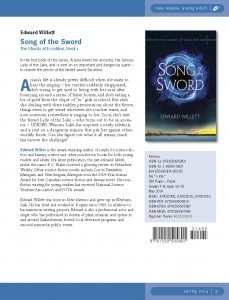 The launch of my back-from-the-dead YA fantasy series The Shards of Excalibur grows ever nearer: Coteau Books has released its spring 2014 catalogue (download the whole thing here) which features Song of the Sword, book one in the five-book series which will continue with Twist of the Blade (currently in rewrites) this fall…with two more as-yet-untitled-and-unwritten books to follow in 2015 and the final book, at least in the initial five-book story arc, to follow in 2016.
The launch of my back-from-the-dead YA fantasy series The Shards of Excalibur grows ever nearer: Coteau Books has released its spring 2014 catalogue (download the whole thing here) which features Song of the Sword, book one in the five-book series which will continue with Twist of the Blade (currently in rewrites) this fall…with two more as-yet-untitled-and-unwritten books to follow in 2015 and the final book, at least in the initial five-book story arc, to follow in 2016.
It won’t be long now!
January 25, 2014
Some thoughts on the reviews of Masks
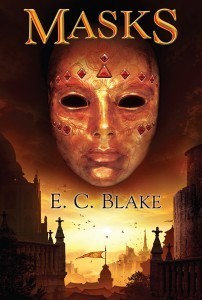 One of the…um, eye-opening…things about having novels published (and at this point, under both this name and others, I’ve had quite a few) is the realization, as the reviews start to come in (if you’re lucky enough to even get reviewed), that not everyone thinks you have written the most amazingly wonderful book of all time. Some people will sing its praises, to be sure. But some will be lukewarm about it, and some will absolutely despise it.
One of the…um, eye-opening…things about having novels published (and at this point, under both this name and others, I’ve had quite a few) is the realization, as the reviews start to come in (if you’re lucky enough to even get reviewed), that not everyone thinks you have written the most amazingly wonderful book of all time. Some people will sing its praises, to be sure. But some will be lukewarm about it, and some will absolutely despise it.
Some authors simply do not read their reviews. My ego does not permit me to be one of those authors. It’s exciting to find out what other people think of something you’ve labored over essentially in solitude for months. It’s gratifying when a reviewer reacts exactly as you hoped readers would react when they were finally exposed to the prose that has had such a long gestation.
But, of course, it is considerably less than gratifying when a reviewer is bored by the book, or dislikes the main character, or objects to this or that plot element…sometimes violently.
I’d prefer everyone like my books, of course, but I understand you can’t please everyone. I would prefer the reviewers that hate the book were a little less forthright in their judgements (“toilet paper” seems a bit harsh, and also impractical: I really don’t think books today are printed on paper absorbent enough, or soft enough, to be made use of in that fashion…not without running considerable risk of irritation). But setting aside my immediate murderous thoughts on reading those kinds of reviews and donning my Mr. Spock air of cool detachment, I am beginning to see what elements of Masks, in particular, elicit strong negative reactions in a (thankfully small) number of readers, and am finding it intriguing.
I’m not linking to any specific reviews in this post because…well, you just can’t argue directly with reviewers as the author. I did stick my nose in one comment feed on one review just to answer a very specific question, but otherwise, I have thus far resisted the urge to answer each and every negative review point by point. It’s a natural reaction to defend yourself, and it’s the entirely wrong reaction that, especially on Goodreads, often results in a violent backlash. You don’t want to end up a cautionary tale in Publishers Weekly.
What I’m really doing below is thinking out loud: my reaction to readers’ reactions to Masks. I appreciate all the reviews (will, almost all), even the less-than-positive ones (well, most of them) because they are at least a sign that people are reading my books.
WARNING: The comments that follow contain mild spoilers for the novel.
First, in overview, something I’ve said before: some of the interesting reactions to this book arise from the fact that it both is and isn’t a YA book. It is, in that the main character is 15. It isn’t, in that the book was not published as a YA book, but as an adult fantasy book of the type DAW is well known for. Plenty of reviewers think it’s a great YA book (School Library Journal, for example) and treat it as such. But I’ve seen a couple of reviewers who are taken aback by its content in the context of a YA book. On the flip side, those approaching it thinking it’s going to be George R.R. Martin will definitely be disappointed. It doesn’t have that level of complexity: for one thing, it’s relentlessly single-viewpoint. Aside from the prologue-flashback, we experience everything through the eyes and mind of Mara. It is what it is: both YA and not-YA, and I think that has confused some reviewers.
One strain of dislike appears to arise from the nature of Mara herself. Mara has just turned 15 and has been torn from her loving and rather idyllic childhood home and exiled to a slave labor camp. She is uncertain and confused and frightened and yes, she makes some really dumb decisions as the story proceeds. Some reviewers find her too unheroic for their taste; others appreciate the fact that she is not an instantly capable heroic figure, but stumbles her way through her terrifying new life just trying to do the best she can and discover what she is capable of…rather like most of us do as teenagers. I find both reactions interesting, and since I know what’s coming for Mara over the next two books, I’m going to be even more interested in reactions going forward.
Now, on the next complaint I confess to being of two minds. Here’s the thing: I often say I’m a fantasy writer with the mind of a science fiction writer. I like writing fantasy, but I have a hard time not thinking about the nuts and bolts of how things work. This is one reason that the magic system in my Lee Arthur Chane novel, Magebane, makes passing nods to the laws of thermodynamics–in the world of Magebane, you need an energy source to perform magic, so the Palace, which uses a lot of magic, also has huge coal-burning furnaces to provide the energy for it–and why in Masks, magic is something that can be mined and collected like a precious metal or crude oil, and there are hints that the black lodestone that is essential to collecting and storing it arrived in Aygrima in the form of an asteroid strike in prehistory. That’s the SF writer in me poking through the fantasy.
So. There’s this thing that never gets talked about in heroic fantasy, or hardly ever: where do people go to the bathroom? In Masks, I made a decision early on to be upfront about that problem. Mara is thrown into a holding cell. There’s a bucket, and there’s no privacy, and both of those are one of the earliest examples of just how drastically her life has changed (you’ll notice there’s no mention of bathroom arrangements until that moment). Once having decided to talk about that, though, I felt I needed to keep talking about it. So no, I don’t describe every time people have to relieve themselves, but I do mention it more often than you’ll probably see in most novels. To me, it was a way of grounding my fantasy very firmly in reality. It also provides a few humorous moments and is handy to the plot. Some reviewers have really latched onto this and find it odd. I’m of two minds about it because it is entirely possible I overdid it a bit, but once you start mentioning bathroom arrangements, you pretty much have to keep mentioning them. (And yes, in Shadows it comes up again, though not nearly as often: it doesn’t figure into the plot as much. I’m still writing Faces, but I think it will hardly be mentioned at all in the third book. Perhaps the characters relieving themselves less often will, ironically, relieve reviewers more.
Finally, there’s a thread running through Masks that some reviewers object to, and that’s the threat of sexual violence against Mara and others. “This is not a YA book,” one reviewer proclaimed, primarily because of that. Another thought it was the “easy” choice and seemed to find it sexist that rape was one of the biggest threats the female characters faced instead of other, more heroic challenges. But once again, the nuts-and-bolts let’s-make-this-as-real-as-possible writer in me was telling me that that threat had to be there.
See, when the Mask fails, Mara literally ceases to be a person in the eyes of her society. At one time, a Mask failing was an instant death sentence. The only reason the unMasked are kept alive now is to serve as slave laborers in the mining camp to which Mara is exiled. That camp is run by male Warden and an all-male staff of guards. The women in the camp are non-people. When I envisioned that, it seemed clear to me that women would be sexually threatened at all times. They have absolutely no power, no legal resource, no one to turn to. They are literally at the mercy of men who have absolutely no reason to show them mercy. I think the threat of rape that runs through the book is entirely realistic. (And far from the “easy” choice, I actually debated it quite a bit–especially one particular scene where Mara disposes of an attacker in gruesome fashion.)
But, yes, it does make the book rather dark, although to those who think it too dark for YA readers I can only say, “Have you actually read any YA recently?”
(Ironically, in view of all this, another strain of complaint is that nothing really bad happens to Mara in the book: she escapes being scarred, her friend suffers the attentions of the camp guards but she doesn’t, etc. Since in my mind the whole book is nothing but bad things happening to Mara, and there’s worse to come in the next two books, I don’t quite know what to make of that complaint…except urge the complainers to read the next book and see if they still feel that way.)
The reviews for Masks continue to show up (I saw a positive one last night, a very negative one this morning). Shadows is on its way. So is my new YA fantasy series The Shards of Excalibur (written as Edward Willett) from Coteau Books, with both the first book, Song of the Sword, and the second, Twist of the Blade, coming out this year, along with the (as-yet untitled) sequel to my science fiction novel Right to Know
is on its way. So is my new YA fantasy series The Shards of Excalibur (written as Edward Willett) from Coteau Books, with both the first book, Song of the Sword, and the second, Twist of the Blade, coming out this year, along with the (as-yet untitled) sequel to my science fiction novel Right to Know , published by Bundoran Press.
, published by Bundoran Press.
With four novels coming out this year alone, and three that I know of for sure (and maybe more) in 2015, I suspect I will continue to find plenty of reason to remind myself of that old adage, “You can’t please all of the people all of the time.”
January 14, 2014
The Space-Time Continuum: Workshops
Today, while writing the next installment of my regular SF/F-writing column “The Space-Time Continuum” for Freelance, the magazine of the Saskatchewan Writers’ Guild, I realized I’d never posted the previous column online…and so here it is!
***
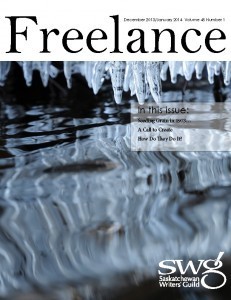 Over the years I’ve participated in a number of science fiction and fantasy writing workshops, to great effect: two of my published novels (Marseguro and Terra Insegura) and a published short story (“Waterlilies”) arose directly out of the Writing With Style workshops instructed by Robert J. Sawyer at the Banff Centre a few years ago.
Over the years I’ve participated in a number of science fiction and fantasy writing workshops, to great effect: two of my published novels (Marseguro and Terra Insegura) and a published short story (“Waterlilies”) arose directly out of the Writing With Style workshops instructed by Robert J. Sawyer at the Banff Centre a few years ago.
Workshops have a long, honorable history in science fiction. As noted SF writer Bruce Sterling puts it, “People often ask where science fiction writers get their ideas. They rarely ask where society gets its science fiction writers. In many cases the answer is science fiction workshops.”
Workshop run the gamut from Clarion, a six-week boot camp for writers taught by professional SF writers at the University of California San Diego (http://clarion.ucsd.edu/), to local amateur workshops formed by groups of like-minded individuals to provide feedback and support to each other. (If I may quote Sterling again, because he’s very quotable, “Like a bad rock band, an SF-writer’s workshop can be set up in any vacant garage by any group of spotty enthusiasts with nothing better to occupy their time. No one has a Copyright on talent, desire, or enthusiasm.”)
So suppose you wanted to organize your own science fiction and fantasy writing workshop. How do you run it?
Over the years, a very simple but effective critiquing system has been developed that is probably used by more SF/fantasy workshops than not. It’s called the “Milford system,” after the workshop where it was first developed. Here’s how it works:
Each of those attending submits a short manuscript to all of the others in the group. If it’s really short, this can be done during the workshop time itself, but more typically the manuscript is provided ahead of time, either at a previous meeting or via email. Only those who submit a manuscript are eligible to comment on the other manuscripts.
At the meeting, everyone sits in a circle and one manuscript is picked at random. The person to the right of the writer delivers his or her critique, and the critiques proceed in order clockwise around the circle, with a minimum of commentary or interruptions from everyone else—and none at all from the author him or herself, who is firmly enjoined to sit in silence and listen no matter how much he or she objects or inwardly squirms.
When the last reader has expressed his or her opinion, the writer at last is permitted to reply, ideally without throwing things or hurling insults. To quote Sterling again, “this harrowing process continues, with possible breaks for food, until all the stories are done, whereupon everyone tries to repair ruptured relationships in an orgy of drink and gossip.”
Clearly you can follow this same procedure for a group focused on writing poetry, mysteries, biographies, or any other kind of fiction—although for some reason science fiction and fantasy seem to generate more wannabe writers than any other genre.
You’ve probably already recognized the potential pitfalls in the Milford system. First of all, the critiquing will only be as good as the writers in the group. Advice on writing from someone who has no particular knowledge or experience may be of limited value, or even detrimental. More troublesome, it can be very hard to maintain the proper detachment when your writing is under attack from a critique—and way too easy to decide to take revenge when it’s your turn to critique. These kinds of group dynamics can make a workshop go south in a hurry.
So if you’re thinking of running a Milford-style workshop, you might also want to keep in mind Schrodinger’s Rules of Critiquing, developed by fantasy writer Holly Lisle for the Schrodinger’s Petshop writing group established in 1988, when she, too, was an aspiring writer. (You can find these and a list of excellent rules for choosing a writers’ group at http://hollylisle.com/the-good-the-bad-and-the-ugly-or-how-to-choose-a-writers-group/.)
Read, and heed:
1. Critique the writing, never the writer. Never say, “You are…” or “You should…” Instead say, “The writing is…” or “The story should…”
2. Find what is right in each piece as well as what is wrong.
3. Don’t say, “This is how I would write it;” how you would write it isn’t the point.
4. Remember that subject matter is personal. You don’t have to like a story to give it a fair critique.
5. Remember what your biases are and critique around them.
6. Remember that real people wrote this stuff, and real people have real feelings. And therefore, among the things you may not say while critiquing: “That’s awful.” “That’s stupid.” “You couldn’t write your way out of a paper bag.”
As for those being critiqued, there’s really only one rule: “Shut up and listen.”
If you can find a group of like-minded people who will follow those rules while critiquing and being critiqued, then you have the makings of a successful writing group, whatever kind of writing you’re interested in.
Go forth and workshop!
January 13, 2014
An interview with me at Nine Day Wonder
The website Nine Day Wonder has just posted an interview with me. Here’s an excerpt that addresses one of the most common questions I’m asked:
DW: E.C. Blake, Lee Arthur Chane, Edward Willett…You’ve gone by multiple pen names, which is not uncommon for writers are prolific as you are. What’s the advantage in building multiple “brands”?
EW: I didn’t use pseudonyms by choice: it was a marketing decision on the part of DAW Books, my New York SF/fantasy publisher. My first three books with them (Lost in Translation, Marseguro and Terra Insegura) were all far-future science fiction. They didn’t exactly set the world on fire (although Marseguro did win the Aurora Award for best Canadian science fiction novel in 2009), and fantasy sells better than SF, so DAW asked me to switch to fantasy. With that switch in genres came not only a new name, Lee Arthur Chane, but a new shot at the marketplace as a new author. Lee Arthur Chane (the middle names of my two older brothers and myself) wrote the steampunk-flavored standalone fantasy novel Magebane. But then my next proposal for DAW was Masks, which is quite different from Magebane: it’s essentially a young adult novel, told entirely from the viewpoint of a 15-year-old girl. That prompted the new new name, E.C. Blake (E.C. being my initials and Blake being the middle name of my nephew—my late mother suggested it, and I wasn’t about to argue). Again, the advantage is that E.C. Blake comes to the marketplace without any expectations of what sort of book he might have written, and has a chance to build up his own fans.
None of these pseudonyms are intended to deceive anyone: it’s obviously an open secret that Edward Willett, Lee Arthur Chane and E.C. Blake are all the same person, if anyone cares to look. But for readers who just come on the books in the bookstore, each not only seems to come from a different author, each has a different flavor. Of course, I hope that everyone who loves Masks will also look for Magebane and the books published under my own name, so I make a point on the E.C. Blake website (one of the downsides of multiple pseudonyms is the need for a website for each!) of listing the other novels I’ve written under my other names.
January 6, 2014
SF Revu calls Right to Know “wildly entertaining”
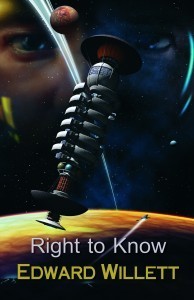 Masks, my fantasy novel written as E.C. Blake, has gotten quite a bit of attention since it came out, whereas my science fiction novel Right to Know, published by Bundoran Press, has been shamefully overlooked…which is why I was pleased when Hayden Trenholm, my publisher and editor at Bundoran, brought this review by Jon Guenther at SF Revu to my attention:
Masks, my fantasy novel written as E.C. Blake, has gotten quite a bit of attention since it came out, whereas my science fiction novel Right to Know, published by Bundoran Press, has been shamefully overlooked…which is why I was pleased when Hayden Trenholm, my publisher and editor at Bundoran, brought this review by Jon Guenther at SF Revu to my attention:
“While I think the book is an attempt to make some strong sociopolitical statements, it proved to be a wildly entertaining read…I found the characters realistic, the plot solid, and the book lacked a lot of exposition…If you want a fun and rollicking SF yarn that I found to be pretty suitable for most age groups, Right to Know is a great selection.”
I think I’d rather have one of my novels called “wildly entertaining” than just about anything else, so, yay!
December 31, 2013
YA or not YA? Qwillery review of Masks hits on a salient point
 I haven’t been posting about all the reviews Masks has been getting because there have been quite a lot of them–more than I’m used to, and a function, I think, of this being my first hardcover release and getting some early favorable attention from the likes of Publishers Weekly and RT Book Reviews.
I haven’t been posting about all the reviews Masks has been getting because there have been quite a lot of them–more than I’m used to, and a function, I think, of this being my first hardcover release and getting some early favorable attention from the likes of Publishers Weekly and RT Book Reviews.
There’s also a long-standing bit of advice to authors to never respond to bad reviews, which has precluded my saying what I’d really like to say to a couple of reviewers who hated the book and gave me the first truly nasty reviews–as opposed to simply negative reviews–I’ve ever received. I confess I’m somewhat puzzled why anyone would even finish a book they hated as much as these reviewers hated Masks, much less then expend two or three valuable hours of their lives writing an insulting review, but then, although I tried writing book reviews on a regular basis myself a couple of years ago, I quickly found I didn’t want to take the time to write a thoughtful review even of books I liked. Perhaps I’m simply not constitutionally cut out to be a reviewer.
Having said that, though, I appreciated a recent review of Masks on The Qwillery where the reviewer wrote:
I’ve read some complaints by other reviewers that Mara is a bit whiny in the book and it drove them away. I think it’s important to talk about the target audience for this book. The publisher has categorized it as General Adult/Grades 12 & Up, however based on the character’s age and the plot, I see it as more of a Young Adult book. I think some adult readers will find Mara on the whiny side, whereas older teenagers may not find it annoying, since they’re still exploring the world around them as well as exploring the same inner emotions and learning how to deal with their world. Mara is true to this and does spend time thinking about what she has been forced to do.
He finishes his review with:
Masks is a strong first book in a promising new series, however, I hope the author finds his target audience by the second book. I’d recommend Masks to older young adults, and adults who enjoy Fantasy and Dystopian fiction with teenage characters or anyone who likes unique magical systems.
He’s hit, I think, on a point that has led to some of the less-favorable reviews. Masks is essentially a YA book published by a publisher that doesn’t have a YA line. If you read it as a YA book, the 15-year-old-girl attributes that some reviewers object to (uncertainty, naivete, bad decision-making, etc.) become a feature, not a bug. If you read it as a fantasy epic on a par with, say, fellow DAW author Patrick Rothfuss’s The Name of the Wind…well, one of these things is not like the other.
I’ve taken to calling it a “YA/adult crossover novel.” Penguin’s publicists have tried to bring it to the attention of the YA world, but it’s also a fantasy novel from DAW, one of the top publishers of fantasy for adults, which means in bookstores and libraries it’s more likely to be in the adult section. My hope is that it finds readers in both worlds…
…even readers who hate it and write insulting reviews of it. Because personally, I’m enough of a contrarian to read a book that threw a reviewer into a spittle-spewing rage just to see for myself if it was really that bad. And from the author’s point of view…either way, I bought the book.
December 29, 2013
Masks makes Fantasy Faction’s list of top 25 fantasy novels of 2013
 This is nice: Masks has been named to Fantasy Faction’s list of the top 25 fantasy novels of 2013. And I get compared to Garth Nix, which is an honour anytime. Marc Aplin writes:
This is nice: Masks has been named to Fantasy Faction’s list of the top 25 fantasy novels of 2013. And I get compared to Garth Nix, which is an honour anytime. Marc Aplin writes:
Masks is a book that took me by complete surprise. Not since the likes of Lirael or Sabriel have I enjoyed a YA with a female protagonist to the extent I did Masks. E.C. Blake breaks the trend of setting YA in an urban environment and goes for a straight coming of age tale in a fantasy world. Our female protagonist is so loveable and innocent that when she is thrown from society – for she puts on a mask designed to tell if one would plan/is planning treason – we share her feelings of pain and – as adults – are disgusted by the injustice of it all. As with Garth Nix’s aforementioned novels, the World is dark, overrun by evil forces and seems to set our protagonist an impossible task. The result is a novel that will emotionally touch you and leave you reeling through it.
December 5, 2013
I’m Dreaming of a White Christmas
Yep, I’ve recorded another Christmas song. Here in Saskatchewan, we don’t exactly “dream” of a White Christmas as have the occasional nightmare about it, but, hey. It’s still a classic.
Enjoy!
http://edwardwillett.com/wp-content/uploads//2013/12/White-Christmas-Mixdown-1.mp3
December 4, 2013
Have Yourself A Merry Little Christmas
I’ve been experimenting with my recording setup today. Now that I have a MacBook, I can have my microphone in the same room as my computer (no fan!), which has opened up much better possibilities for doing things like mixing my voice with backing tracks.
Which is how I created this. I only did a couple of vocal takes and didn’t do any editing, so this is a straight-through recording–a little rough in spots, but serves as a proof of concept.
Whaddya think?
http://edwardwillett.com/wp-content/uploads//2013/12/Have-Yourself-A-Merry-Little-Christmas.mp3



